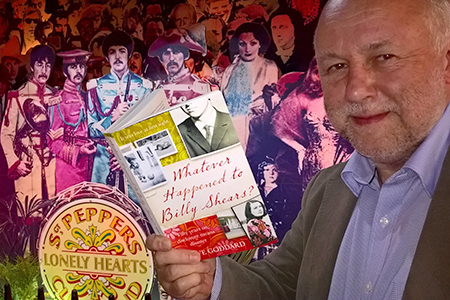| |
 |
 |
 |
| The story so far... |
 |
| You're currently on our features and projects pages, with material ranging from the satirical to the theological. For more features, click here. |
| |
|
|
 |
 |
 |
| Whatever happened to Billy Shears? |
 |
One handstand. That’s all it took. And Lucy Pitcher spun William Shearwater’s world upside down. Fifty years on from 1967 and the Summer of Love, ‘Shears’ is a squeaky-clean Anglican chaplain, nursing memories of a lost and secret love. So begins a new novel by Ship of Fools co-editor Steve Goddard. We stuck a vinyl copy of Sgt. Pepper on the turntable and asked Steve to tell us all about it.
Your main character, Canon William Shearwater (or Billy Shears to his friends) has worked in the media for decades. He reminds me of someone.
(Laughs) Can't deny it. They say first novels are autobiographies. In my case it was the second. There are many differences, of course. I'm not ordained, for example, though I have a degree in theology.
We first meet Billy towards the end of his career, still looking for the 'big break'. Is that how you feel about yourself?
What an interesting question! I'd love the book to generate favourable reviews and sales but I don't hanker after fame and fortune.
Throughout the book, Billy reflects on his early teenage years in the mid-1960s. You obviously enjoyed that period in your life.
There's a well-worn cliché: if you can remember the 60s, you weren't there. That's rubbish. It wasn't all about drugs. Most people got on with their lives as before. Read Dominic Sandbrooks' excellent social history, White Heat, if you don't believe me. England ruled the world at football and pop music. What else mattered? Everything was changing for the better, or so we thought. Maybe that idealism is what drives Billy on – even in late middle age – as he leads a campaign to bring football back to its roots in the community.
Hmmm, well in the novel Billy smokes pot...
Goaded on by his first love, Lucy.
That must be autobiographical.
I hated the smell of the stuff. Still do. At an Arlo Guthrie concert in 1972, a joint came down my row. I stubbed it out. The bloke who passed it to me gave me a long, glassy stare. He might have punched me if he hadn't been stoned.
Billy's quite straight, isn't he?
And Lucy laughs at him for it.
I'm not sure if we're supposed to like Billy, though.
How do you mean?
On the one hand he is funny and self-deprecating. I'm thinking of the moment when Lucy pushes up close to him in the tiny guinea pig shed: we all remember the agony of teenage desire. On the other hand, he has never told his wife about her.
Lucy is his Achilles heel.
Yet when a fellow priest shacks up with the church organist's wife, he shows no mercy.
He is only doing his job – keeping the story out of the media.
But it comes back to bite him in the butt.
No spoilers, please!
Your other central character is Sophie Daggert, a forty-something widow adopted at birth. Is she modelled on anyone in particular?
Though not adopted herself, Sophie resembles my wife, Allison, in that she teaches at a sixth form college. Sophie's personality is an amalgam of several people I know.
We read her intimate diary as she recovers from the death of her husband. Was writing as a woman difficult?
To my mind, she was a person who happened to be a woman. The gender issue never really bothered me. I hope that comes across.
The issue of adoption also features in your first novel, Rattles and Rosettes (2014).
That's because, during the Summer of Love in 1967, my mother gave lodgings to a young Scottish woman, pregnant with an 'illegitimate' child. She was bright, profane and sexy – an exotic cocktail. We got on famously and when she gave birth to a boy, called him Stephen. I became something of a surrogate father. On the day Stephen's adoptive parents came to collect him, I didn't want to let him go. We weren't allowed to know the name of the couple by law but I memorised the registration number of their car. Mum was horrified. 'You must never, ever tell anyone what it is,' she said. I didn't write it down but I could tell you exactly what it was today, 50 years later.
So you've no idea what happened to Stephen, or his mother?
No idea. I half expect them to appear on the TV series Long Lost Family. The programme's researchers help mothers track down children they were forced to give up for adoption. Encounters between birth mothers and their adult offspring are intense and profoundly moving.
You told me earlier that some other characters also came into your life in 1967.
You could say that. Circus performer Mr Kite, a family called the Hendersons, a parking meter attendant called Rita, a horse called Henry – and a nervous, love-struck singer called Billy Shears.
I remember June 1967 as well. None of us had ever heard or seen anything like Sgt. Pepper's Lonely Hearts Club Band.
It wasn't so much a record as an existential encounter: the dream-like haze of Lucy in the Sky with Diamonds, the fairground fantasy of Being for the Benefit of Mr. Kite – culminating in the 'orchestral orgasm', as producer George Martin called it, of A Day in the Life.
Lyrically, Pepper gave us a snapshot of 1960s Britain in cultural flux.
True. We had heard a thousand songs about faraway California and Kansas City, Tulsa and Texas. Never before had unfashionable places like the Isle of Wight, Blackburn and London's Bishopsgate featured prominently on a 'pop' album. But after we'd followed her down to the bridge by the fountain, what happened to Lucy? Lennon always claimed the song wasn't about LSD, but you can't help wondering if she ever went on a bad trip. Did Billy Shears get over his nerves and sing to audiences far and wide? The Beatles left us to make up our own minds, of course. And, in real life, what happened to young Stephen, now heading for his 50th birthday? These were the starting points for the novel.
There isn't a direct quote from the songs on Pepper and you don't even mention the Beatles anywhere.
I allude to the characters and songs, that's all.
The story opens with a car accident at traffic lights in Blackburn.
But we don't know who the people are in the car, how the accident happened, or why.
So the novel is a kind of whodunnit.
Kind of...
There are so many twists and turns that you really don't know how the plot will resolve until the last page.
Even I wasn't sure how it would end – until I got there myself! I was reminded of Bill Forsyth's movie Local Hero. Only at the last minute did he add the scene of the phone ringing as the credits roll. A clip of those final few moments has been watched more than 52,000 times on YouTube. It makes the movie.
Yes, you allude to Local Hero in several places.
In fact, the phone box in Pennan, on the north-facing coast of Scotland, where a lot of the movie was filmed, features on the front cover of the book. It plays a part in the story. Because of Local Hero, the phone is now a listed building, by the way.
I hardly need ask if you liked the film.
Forsyth's script, Puttnam's production, Knopfler's music... it's shatteringly beautiful, the saddest, deepest comedy ever made. Forsyth built on the myths and legends of Scotland, deliberately subverting them along the way. I've tried to add another mystical layer. Oh, and I want Knopfler's theme, Goin' Home, at my funeral. The family have been told.
One of the book's darker, topical themes is historic sexual abuse.
I wanted to look at it from the point of view of Billy, a communications consultant.
Covering it up, you mean...
Hmmm... limiting the damage is more accurate.
In Trumpspeak, providing 'alternative facts'... you were once director of communications for the Diocese of Manchester.
Briefly.
And the story is based on your own experiences?
Strictly, no. But all such directors are tasked to similarly defend the indefensible.
Billy is complicit in the deceit.
It's his job.
That paints a very bleak picture of the Church.
All institutions have been at fault. It's just that the Church calls people to a higher moral code and its authority has been undermined by the few who have abused their privileged position.
So, if anyone wants read the novel, it's published through Marylebone House in London.
It wasn't an easy idea to sell but the people at Marylebone House got it immediately and have helped develop it throughout the creative process. I am indebted to them.
Whatever Happened to Billy Shears? was published in April by Marylebone House. Price £8.99.
|
|
|
|
|
|
|


